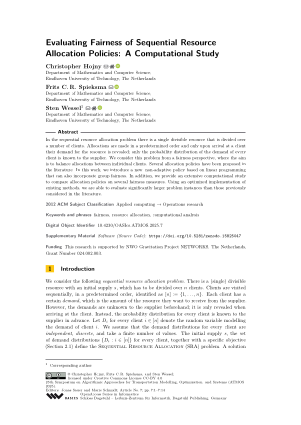Evaluating Fairness of Sequential Resource Allocation Policies: A Computational Study
Authors
Christopher Hojny  ,
Frits C.R. Spieksma
,
Frits C.R. Spieksma  ,
Sten Wessel
,
Sten Wessel 
-
Part of:
Volume:
25th Symposium on Algorithmic Approaches for Transportation Modelling, Optimization, and Systems (ATMOS 2025)
Part of: Series: Open Access Series in Informatics (OASIcs)
Part of: Conference: Symposium on Algorithmic Approaches for Transportation Modelling, Optimization, and Systems (ATMOS) - License:
 Creative Commons Attribution 4.0 International license
Creative Commons Attribution 4.0 International license
- Publication Date: 2025-10-17
File

PDF
OASIcs.ATMOS.2025.7.pdf
- Filesize: 0.67 MB
- 14 pages
Document Identifiers
Subject Classification
ACM Subject Classification
- Applied computing → Operations research
Keywords
- fairness
- resource allocation
- computational analysis
Metrics
- Access Statistics
-
Total Accesses (updated on a weekly basis)
0PDF Downloads0Metadata Views
Abstract
In the sequential resource allocation problem there is a single divisible resource that is divided over a number of clients. Allocations are made in a predetermined order and only upon arrival at a client their demand for the resource is revealed; only the probability distribution of the demand of every client is known to the supplier. We consider this problem from a fairness perspective, where the aim is to balance allocations between individual clients. Several allocation policies have been proposed in the literature. In this work, we introduce a new, non-adaptive policy based on linear programming that can also incorporate group fairness. In addition, we provide an extensive computational study to compare allocation policies on several fairness measures. Using an optimized implementation of existing methods, we are able to evaluate significantly larger problem instances than those previously considered in the literature.
Cite As Get BibTex
Christopher Hojny, Frits C.R. Spieksma, and Sten Wessel. Evaluating Fairness of Sequential Resource Allocation Policies: A Computational Study. In 25th Symposium on Algorithmic Approaches for Transportation Modelling, Optimization, and Systems (ATMOS 2025). Open Access Series in Informatics (OASIcs), Volume 137, pp. 7:1-7:14, Schloss Dagstuhl – Leibniz-Zentrum für Informatik (2025)
https://doi.org/10.4230/OASIcs.ATMOS.2025.7
BibTex
@InProceedings{hojny_et_al:OASIcs.ATMOS.2025.7,
author = {Hojny, Christopher and Spieksma, Frits C.R. and Wessel, Sten},
title = {{Evaluating Fairness of Sequential Resource Allocation Policies: A Computational Study}},
booktitle = {25th Symposium on Algorithmic Approaches for Transportation Modelling, Optimization, and Systems (ATMOS 2025)},
pages = {7:1--7:14},
series = {Open Access Series in Informatics (OASIcs)},
ISBN = {978-3-95977-404-8},
ISSN = {2190-6807},
year = {2025},
volume = {137},
editor = {Sauer, Jonas and Schmidt, Marie},
publisher = {Schloss Dagstuhl -- Leibniz-Zentrum f{\"u}r Informatik},
address = {Dagstuhl, Germany},
URL = {https://drops.dagstuhl.de/entities/document/10.4230/OASIcs.ATMOS.2025.7},
URN = {urn:nbn:de:0030-drops-247635},
doi = {10.4230/OASIcs.ATMOS.2025.7},
annote = {Keywords: fairness, resource allocation, computational analysis}
}
Author Details
- Department of Mathematics and Computer Science, Eindhoven University of Technology, The Netherlands
- Department of Mathematics and Computer Science, Eindhoven University of Technology, The Netherlands
Funding
This research is supported by NWO Gravitation Project NETWORKS, The Netherlands, Grant Number 024.002.003.
Supplementary Materials
- Software (Source Code) https://doi.org/10.5281/zenodo.15825047
References
- Yehuda Bassok and Ricardo Ernst. Dynamic allocations for multi-product distribution. Transportation Science, 29(3):256-266, 1995. URL: https://doi.org/10.1287/trsc.29.3.256.
- Robert W. Lien, Seyed M. R. Iravani, and Karen R. Smilowitz. Sequential resource allocation for nonprofit operations. Operations Research, 62(2):301-317, 2014. URL: https://doi.org/10.1287/opre.2013.1244.
- Vahideh Manshadi, Rad Niazadeh, and Scott Rodilitz. Fair dynamic rationing. Management Science, 69(11):6818-6836, 2023. URL: https://doi.org/10.1287/mnsc.2023.4700.
- Sean R. Sinclair, Gauri Jain, Siddhartha Banerjee, and Christina Lee Yu. Sequential fair allocation of limited resources under stochastic demands. Preprint, 2022. URL: https://arxiv.org/abs/2011.14382.
- N Sluijk, W Rei, J Kinable, M Gendreau, and T Van Woensel. Fair stochastic vehicle routing with partial deliveries. Preprint, 2023. URL: https://optimization-online.org/?p=22778.
